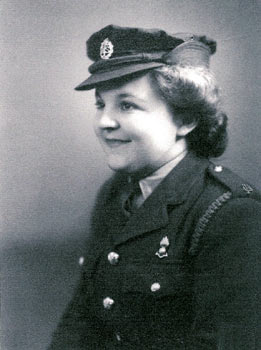 |
Wrington Website: Trevor Wedlake's Writings Mary Bond |
 |
Wrington Website: Trevor Wedlake's Writings Mary Bond |
|
Trevor Wedlake wrote this piece after the passing of Mary Bond, 16th July, 2003 |
 |
||||
| Beam Mills on the Blagdon Yeo at the southernmost end of Wrington, was a long-established flock mill. It also had a factory and warehousing which manufactured for the farming and saddlery businesses. They made harness and horse collars, repaired canvasses for the harvest-field binder, and made and repaired leather goods of many kinds. They made ropes: ropes of jute and hemp, and white cotton for the show ring, wagon lines, plough lines, and church bell ropes. None of these work places was heated or insulated. |
||||
| At 20 Mary was a many skilled and senior member of the factory staff. But this was 1941 and names of cities like Smolensk and Kharkov and Kuibyshev from the Eastern front were becoming familiar on the BBC, and Mary, now 20, knew that military life beckoned. But Mr Organ, the mill owner, made it clear that, because of their importance to the agricultural industry she was not eligible for enlistment, that hers was a reserved occupation. Never in all her long life was Mary one to be directed or coerced, and off she went to the ATS. During her early square-bashing the window lowered on a passing army truck and a voice shouted "Stick thee chest out, Bondy !" This was fellow Wringtonian Pte Arthur Clements (Emmet). Following service in various parts of England, Mary returned to the village. By now technology had moved on; the tractor had displaced the horse, the mill had been sold and work transferred to Bristol. So Mary joined NAAFI and thoroughly enjoyed being posted to work in Austria, Egypt and central Africa. Following these years with NAAFI she became a seamstress at the boys' orphanage at Badgworth Court near Cheltenham. Her training at the mill provided her with the required skill, and she worked there 11 years. She then moved to Clevedon to the girls' orphanage; when this closed she feared greatly for the future of these young people. Until retirement Mary then had a variety of jobs nearer home. She displayed her independent, almost self-willed spirit, by taking off frequently on foreign travel quite alone. She would fly off with her kit-bag full of camping gear. No doubt Mary was very independent, not easily guided or persuaded. Yet her work with vulnerable children and nursing the disabled underlined her basic kindliness. She was patient, gentle, moderate, temperate - which attributes St Thomas More accounted imperative in the aspiring Christian. Mary's home was Rose Cottage, Silver Street, where she was born. Mary, who never married, died on July 16th aged 82. Her death brought many of her old friends to a sombre moment of reflection and examination. In recent years I sometimes met Mary on Sunday mornings in the churchyard as she cut through from Church Walk en route to join her sister for Sunday lunch. We'd talk away as old friends do, and sometimes to the detriment of the Sunday roast ! Then hostess Rita would erupt from her cottage just beyond the north gate, arms waving, pinny flying, and we'd break off hurriedly, mid-sentence without goodbyes ! A week or two later we'd meet again, same place. Again we'd "stir the dusty memories" of that old village so long gone, so remote that it cannot now be revisited except in excursions of memory and imagination: when "summer's lease" was long and fine, and farm wagons rumbled to the barns loaded with hay, and returned to the hayfield loaded with children; when the little train steamed into the station every day; when Mr Hurley, the village barber in Station Road, cut men's hair 4d, boys' 3d, shaving 2d - shaving before hair-cutting after 5pm on Saturday - as he had done since June, 1910; when the Salvation Army marched behind their band and preached their message to empty streets on Sunday afternoons; when 3 times every day, at 7.30am, 12 noon, and 6.30pm, whether it summoned the devout to prayer or merely diverted their eyes to the mantle clock, there came from All Saints' the plaintive ringing of the Angelus. Trevor Wedlake |
||||